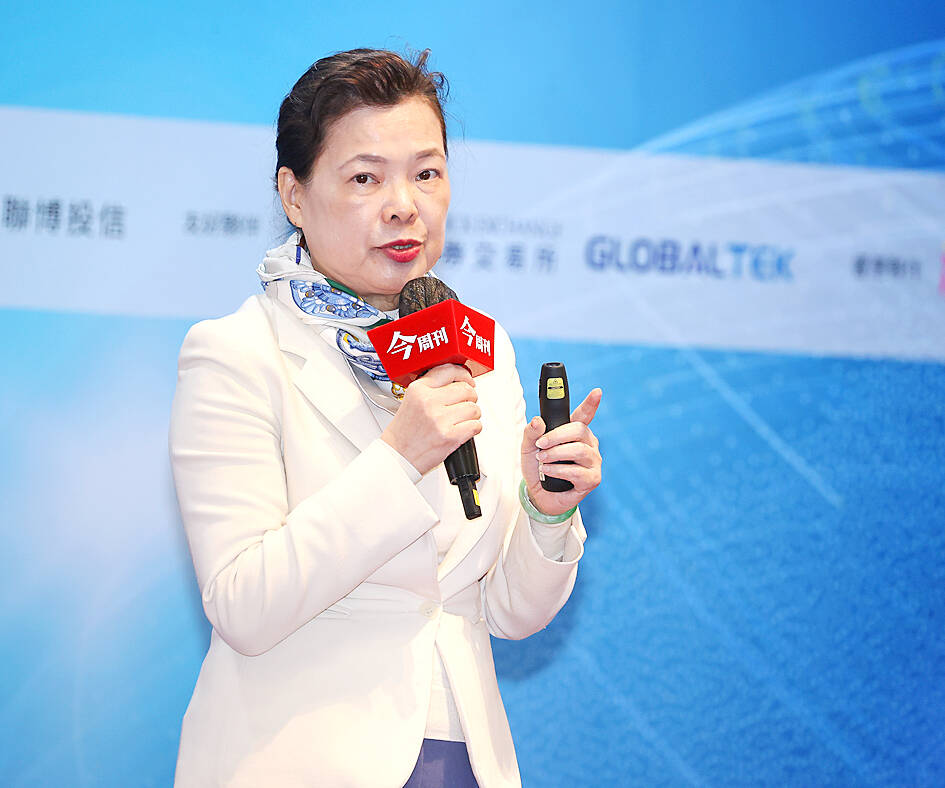The government is working to prepare businesses for the possibility that China could withdraw from its trade agreement with Taiwan, Minister of Economic Affairs Wang Mei-hua (王美花) said, adding that Taiwan is not alone in facing Chinese economic coercion.
In a television interview broadcast on Saturday night, Wang was asked about China announcing the suspension of preferential tariffs on petrochemical products under the Economic Cooperation Framework Agreement (ECFA).
The Chinese Customs Tariff Commission on Dec. 21 last year announced it was suspending preferential tariffs on 12 petrochemical products, including propylene and paraxylene, citing trade barriers imposed by Taiwan on similar products.

Photo: CNA
In addition to Taiwan, Beijing has also use economic coercion against Australia, Canada, Japan, Lithuania and South Korea for its own political ends by leveraging its trade relationships with those countries, Wang said.
Taiwanese exports to China covered by ECFA fell to US$15 billion last year, from US$20.5 billion in 2022, due to China’s economic downturn and its increase in domestic supply in related industries, she said.
“We have discussed with the petrochemical industry in particular and urged them to come up with a long-term plan in response to China’s increase of supply of its own petrochemical industry from the upstream to downstream,” she said.
Taiwan is also not the only country that worries about decreasing petrochemical exports to China, “as with China’s increasing production, the global petrochemical industry also feels the pressure and many worry about it could engage in dumping,” she said.
The government has already held many meetings with other industries covered by the ECFA to help them broaden their client base, Wang said.
Taiwan’s total exports have performed well over the past three years, benefiting from investments by returning Taiwanese businesses due to a US-China trade conflict and from the country’s resilient manufacturing during the COVID-19 pandemic, she said.
The nation’s exports reached US$400 billion annually from 2021 to last year, with a record of US$479.4 billion in 2022, ministry data showed.
On foreign interest, three major companies in the semiconductor industry — ASML Holding NV, Applied Materials Inc and Lam Research Corp — have invested in Taiwan, Wang said.
The government played a facilitating role in securing the three companies’ investments, which would further embed Taiwanese firms in global supply chains, she said.
For example, the land for ASML’s plant in New Taipei City’s Linkou District (林口) required cross-ministerial discussions, and the government also helped in the setup of Applied Materials’ Asian equipment parts logistics center in Taoyuan, aiding in negotiating for the waving of approval for Chinese-made parts not used by domestic companies, she said.
Germany’s Merck Group has also invested in Taiwan, setting up a new semiconductor solutions megasite in Kaohsiung last year, which both the central and local governments worked to facilitate, she said.

To many, Tatu City on the outskirts of Nairobi looks like a success. The first city entirely built by a private company to be operational in east Africa, with about 25,000 people living and working there, it accounts for about two-thirds of all foreign investment in Kenya. Its low-tax status has attracted more than 100 businesses including Heineken, coffee brand Dormans, and the biggest call-center and cold-chain transport firms in the region. However, to some local politicians, Tatu City has looked more like a target for extortion. A parade of governors have demanded land worth millions of dollars in exchange

An Indonesian animated movie is smashing regional box office records and could be set for wider success as it prepares to open beyond the Southeast Asian archipelago’s silver screens. Jumbo — a film based on the adventures of main character, Don, a large orphaned Indonesian boy facing bullying at school — last month became the highest-grossing Southeast Asian animated film, raking in more than US$8 million. Released at the end of March to coincide with the Eid holidays after the Islamic fasting month of Ramadan, the movie has hit 8 million ticket sales, the third-highest in Indonesian cinema history, Film

Taiwan Semiconductor Manufacturing Co’s (TSMC, 台積電) revenue jumped 48 percent last month, underscoring how electronics firms scrambled to acquire essential components before global tariffs took effect. The main chipmaker for Apple Inc and Nvidia Corp reported monthly sales of NT$349.6 billion (US$11.6 billion). That compares with the average analysts’ estimate for a 38 percent rise in second-quarter revenue. US President Donald Trump’s trade war is prompting economists to retool GDP forecasts worldwide, casting doubt over the outlook for everything from iPhone demand to computing and datacenter construction. However, TSMC — a barometer for global tech spending given its central role in the

Alchip Technologies Ltd (世芯), an application-specific integrated circuit (ASIC) designer specializing in server chips, expects revenue to decline this year due to sagging demand for 5-nanometer artificial intelligence (AI) chips from a North America-based major customer, a company executive said yesterday. That would be the first contraction in revenue for Alchip as it has been enjoying strong revenue growth over the past few years, benefiting from cloud-service providers’ moves to reduce dependence on Nvidia Corp’s expensive AI chips by building their own AI accelerator by outsourcing chip design. The 5-nanometer chip was supposed to be a new growth engine as the lifecycle